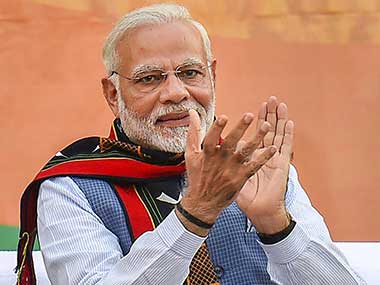Thanks to last week’s ugly turn of events involving data harvesting, psychographic profiling and the alleged unethical influencing of votes in the US elections by British firm Cambridge Analytica and social network Facebook, any data gathering involving Internet apps is suddenly being viewed with suspicion. It comes as no surprise therefore that the Narendra Modi app has become a matter of controversy. Allegations of data being sent overseas, without consent, to a US company reek of what happened in the US and the UK last week. When grey areas in data science meet political innuendo, the results can be incendiary in the age of real-time social media. So what are we to make out, as some engaged digital-age activists are saying , of a society that loves to share personal data but does not like it to be unsafe? [caption id=“attachment_4404143” align=“alignleft” width=“380”]  File image of Prime Minister Narendra Modi. PTI.[/caption] Last week, I had said half in jest that ‘consent has moved from sex to data’. Truth is that both are separately important, but last week at least, the public focus was more on Mark Zuckerberg, Facebook’s beleaguered CEO, than on disgraced Hollywood producer Harvey Weinstein or even President Donald Trump, whose sexual misdemeanours are hogging headlines the world-over. Given that we are entering an election year in India, mutual swipes and wild accusations by the Congress, the AAP and the BJP on use or abuse of data is bound to go up. We are also faced with the unique situation where Google and Facebook, friends of the Election Commission up until yesterday for their awesome reach into Indian voter minds, are suddenly becoming unwanted wannabe spies. One piece of bad news is enough. Now take a deep breath. Apps — be it of Facebook or Narendra Modi — are meant to gather data. Targeted content, sales offers and advertisements are part of the official business models of Google, Amazon and Facebook. All of a sudden, there are three hard issues at stake: unethical use of profiling; use of such profiling to mislead people into voting (you can call it data-based ambush); and the presence or alleged interference of foreign powers in a scenario of a globally connected social network. In India, the harsh ground reality is that we are being forced to leapfrog into a Big Brother syndrome and deal with it. Laws are yet to catch up with reality. It’s a bit like someone discovering the joys of sex being suddenly informed that there is also such a thing called a sexually transmitted disease. The Supreme Court (SC), which is still hearing a case on whether the Aadhaar unique ID breaches the rights of citizens in terms of data protection, safety and freedom, passed a verdict on the right to privacy less than a year ago. Data protection was a key issue in the software industry a year ago when business process outsourcing (BPO) companies were targeted by trade unions and protectionists in Europe as violative of data privacy. Too much has happened across the globe since then, including in India. The country does not yet have a real law in place for data protection. Only contract laws and the Information Technology Act of 2000 are in place and a real data protection law is still in the works. The Justice Srikrishna committee, which is drafting a proposed data protection framework, began its public consultation process with an open house only two months ago. It is time perhaps for the Supreme Court to pronounce a quick view on the subject and for the Srikrishna panel to push out an early set of data hygiene guidelines, so that those already thriving in the grey areas or caught on the wrong side of an emerging discipline can quickly learn and act in the interest of national consensus. Political mudslinging has found a new platform in data hygiene but it is best for us to ignore the noise and focus on real safety and protection. And while at that, it would be a good idea to have a Lokpal for data – some kind of a ‘go-to’ data ombudsman with credibility and political neutrality who can issue quick pronouncements to block out the emerging noise. It is best done with some constitutional validity, as an ombudsman friendly to the government can only be viewed with suspicion. Given the way India’s courts are burdened with cases, it is too much to expect a creaking judiciary to talk in detail just as more cases pile up. Note: The Congress pulled its 'With INC' app off all OS stores on Monday The author is a senior journalist. He tweets as @madversity
When grey areas in data science meet political innuendo, as with the controversy around the Narendra Modi app, results can be incendiary in the age of real-time social media
Advertisement
End of Article


)

)
)
)
)
)
)
)
)



